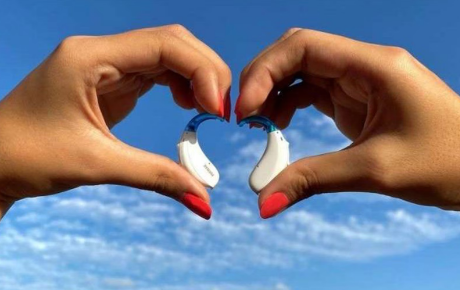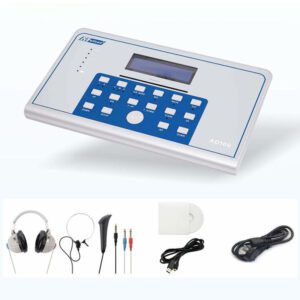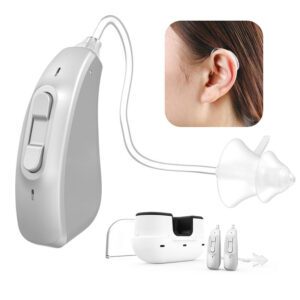hearing Loss affects millions of people worldwide, and hearing Aids are often considered a primary solution for improving hearing and communication. But a common question arises: can fully deaf or severely hard-of-hearing individuals benefit from hearing aids? Many people are also curious about why some deaf people choose not to use hearing aids, how many do, and what the costs are. This article explores these questions in depth to provide clarity for those considering hearing solutions.

Types and Degrees of Hearing Loss
Understanding the type and severity of hearing loss is essential when discussing the effectiveness of hearing aids. Hearing loss generally falls into three categories:
Conductive Hearing Loss – Occurs when sound waves cannot efficiently travel through the outer or middle ear. Hearing aids are often highly effective for this type.
Sensorineural Hearing Loss – Caused by damage to the inner ear or auditory nerve. This is the most common type and can range from mild to profound. Hearing aids can help, but results vary depending on severity.
Mixed Hearing Loss – A combination of conductive and sensorineural loss, which may require specialized hearing solutions.
The degree of hearing loss also plays a critical role. Mild to moderate hearing loss usually responds well to conventional hearing aids, while severe or profound hearing loss may require alternative solutions like cochlear implants.
How Hearing Aids Work
hearing Aids are electronic devices designed to amplify sound for individuals with hearing loss. They work by picking up sound through a microphone, processing it via an amplifier, and delivering it to the ear through a speaker. Common types include:
Behind-the-Ear (BTE) Hearing Aids – Fit behind the ear and are suitable for most degrees of hearing loss.
In-the-Ear (ITE) Hearing Aids – Custom molded to fit inside the ear canal, ideal for mild to severe hearing loss.
Bone-Conduction Hearing Aids – Deliver sound vibrations through the bones of the skull for those with conductive hearing loss or single-sided deafness.
Hearing aids are most effective when the auditory nerve and inner ear are still functional. In cases of profound deafness, amplification alone may not restore meaningful hearing.
Can Fully Deaf People Use Hearing Aids?
The short answer: it depends on the type and severity of deafness. Hearing aids amplify sound, but if the inner ear or auditory nerve is severely damaged, amplification may provide little benefit. For individuals who are fully deaf or profoundly hard of hearing, cochlear implants are often a more effective solution. These devices bypass damaged portions of the ear and directly stimulate the auditory nerve, offering the potential for better sound perception than hearing aids alone.
However, some people with residual hearing—even if they are considered profoundly deaf—may still find limited benefit from hearing aids, especially in combination with cochlear implants or other assistive technologies.
Why Some Deaf People Do Not Use Hearing Aids
Despite the availability of hearing aids, not all deaf individuals choose to use them. Several factors contribute to this decision:
Limited Effectiveness: For those with profound sensorineural hearing loss, hearing aids may not significantly improve hearing.
Cost and Maintenance: Hearing aids can be expensive, and ongoing maintenance adds to the cost.
Comfort and Lifestyle: Some users find hearing aids uncomfortable or prefer not to wear them for personal reasons.
Cultural and Social Factors: Many members of the Deaf community view deafness as a cultural identity rather than a disability, and may prefer to rely on sign language rather than hearing devices.
Hearing Aid Usage Among Deaf People
What percent of deaf people use hearing aids? Statistics vary by country and population. In general, a significant proportion of people with mild to moderate hearing loss use hearing aids, while the usage rate decreases among those who are profoundly deaf. Globally, estimates suggest that only about 20–30% of individuals who could benefit from hearing aids actually use them, often due to cost, accessibility, or personal choice.
The Cost of Hearing Aids for Deaf Individuals
How much do hearing aids cost for a deaf person? Prices vary depending on the type, brand, and technology level:
Basic hearing aids: $1,000–$2,000 per device
Mid-range hearing aids: $2,000–$4,000 per device
Premium hearing aids: $4,000–$6,000 or more per device
Insurance, government programs, and subsidies can help offset these costs, but they remain a significant consideration for many families.
Benefits and Limitations
Hearing aids can significantly improve communication, social interaction, and quality of life for many individuals. They can reduce feelings of isolation, improve participation in social activities, and positively affect mental health. However, they are not a universal solution. Their effectiveness is limited for individuals with profound hearing loss, and they may not completely restore natural hearing.
How to Decide if a Hearing Aid is Right for You
Determining whether a hearing aid is suitable involves a professional hearing evaluation. Audiologists or hearing specialists can assess the degree and type of hearing loss, discuss lifestyle needs, and recommend the most appropriate device. Sometimes a combination of hearing aids, cochlear implants, or other assistive technologies provides the best outcome.
Conclusion
Hearing aids are valuable tools for many people with hearing loss, but their effectiveness depends on the severity and type of deafness. Fully deaf individuals may find limited benefit from hearing aids alone and might consider cochlear implants or other alternatives. Cost, personal preference, and cultural factors also influence whether deaf individuals choose to use hearing aids. Consulting a professional is essential for making an informed decision and achieving the best possible hearing experience.


